That's it from uspublished at 17:28 BST 10 June 2021
Today's live page posts were written by Hazel Shearing, Lauren Turner, Jo Couzens and Richard Morris.
They were edited by Katie Wright and Emma Owen.
Thanks for tuning in, we'll be back tomorrow.
Matt Hancock says the Delta variant first identified in India now comprises 91% of new Covid cases seen in the UK
His comments came as he defended his handling of the pandemic during four hours of questioning from MPs
He rejects criticism from Dominic Cummings, including that he had lied to the PM about care home testing
Locking down earlier than 23 March last year would have gone against the scientific advice at the time, he says
Hancock says he "bitterly regrets" not overruling scientific guidance the virus could not be spread asymptomatically
And he says he followed clinical advice on patients being released from hospitals to care homes and was told they would be tested
The UK has reported more than 7,000 daily Covid cases for a second day running
The latest government figures also show there were another seven deaths within 28 days of a positive test
The UK's recovery from the pandemic lagged behind other big economies in the first three months of 2021
Edited by Katie Wright
Today's live page posts were written by Hazel Shearing, Lauren Turner, Jo Couzens and Richard Morris.
They were edited by Katie Wright and Emma Owen.
Thanks for tuning in, we'll be back tomorrow.
We'll shortly be wrapping up for the day. Here's what you need to know:
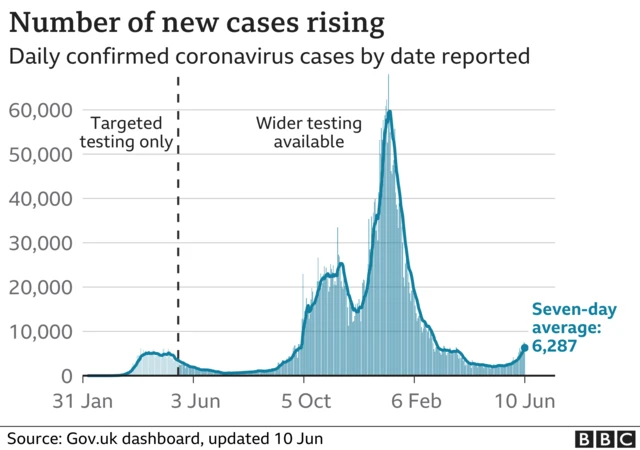
Dr Jenny Harries, chief executive of the UK Health Security Agency, said earlier that data suggests there will be a further rise in cases "in coming weeks"

Marianna Spring
Specialist disinformation and social media reporter
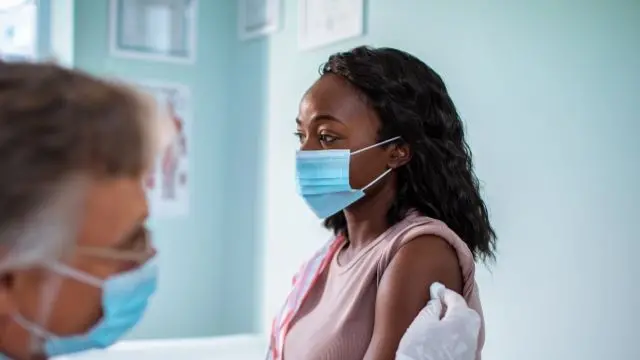 Image source, Getty Images
Image source, Getty ImagesAccording to NHS England, a record number of young people have booked appointments for vaccines after those over 25 were invited to have their jabs.
But anti-vaccine activists are still targeting younger people online.
Videos and posts promoting conspiracy theories that vaccines will cause miscarriages or affect fertility have circulated for months, aimed at younger women in particular.
Anecdotally, we’ve seen an uptick in recent days, just as younger people have been offered a jab.
Emotive content is being shared on sites like Instagram and TikTok, as well as in Facebook groups.
Several women - as well as doctors working at vaccine centres - have messaged me with worries that these conspiracy theories may frighten some off the jab.
We’ve looked into claims about vaccines affecting periods - and unsubstantiated claims that they could cause miscarriages - read more on that here.
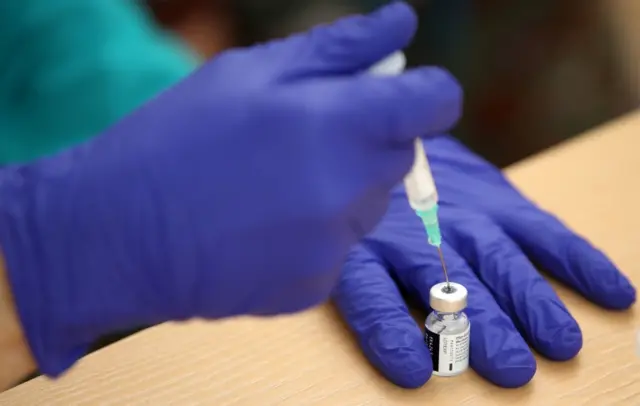 Image source, PA Media
Image source, PA MediaNearly one in three older adult care home workers in England has not been fully vaccinated against coronavirus, new figures from NHS England show.
The latest data shows that 68.7% of eligible staff at older adult care homes had been given both doses of vaccine by 6 June. Since the vaccine programme began, 83.7% of staff have been given a first jab.
In total, 95.3% of older adult care home residents have had a first jab and 90.5% have had both.
Residents and staff are eligible for the vaccine if they have not had Covid-19 in the previous 28 days. And they are both in the top priority group of the vaccination programme.
Meanwhile, 82.7% of residents at younger adult care homes have received both doses now.
 Faisal Islam
Faisal Islam
BBC Economics Editor
The US was worst hit by the pandemic in the G7 big Western democracies over the first year of Covid-19, according to an updated study of excess death figures.
The analysis, done for the BBC by the Health Foundation, comes on the eve of the G7 summit in Cornwall and measures deaths above expected levels for a normal year.
Last year, an earlier BBC study showed that at that point, the UK had been hardest hit. Overall, UK outcomes are now second worst in the G7.
The analysis shows that in the second half of last year in particular, US levels of excess deaths failed to drop back as much as other comparable industrialised nations.
The UK's worse outcomes in the first wave, and a significant peak of deaths in December and January, still mean that overall UK outcomes were second worst, on one measure just behind the US.
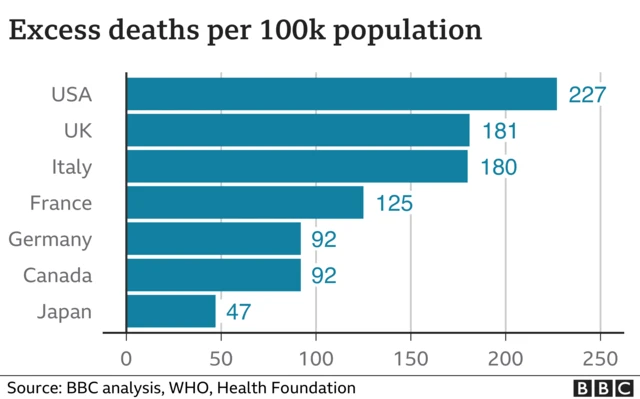
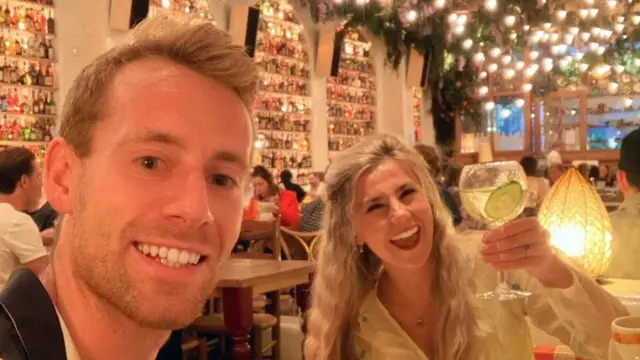 Image source, Tommy Router
Image source, Tommy RouterFor people wanting to get married, the wait continues as cases of the Delta variant rise ahead of the planned 21 June unlocking.
One couple has been telling the BBC how that has been for them. Tommy Router, 30, and his fiancée Caroline Dorman, 29, got engaged in 2019 and were supposed to get married last summer, with a reception at his parents' garden in Hingham, Norfolk.
Since last summer, the couple have spent weeks making and then changing various contingency plans for a wedding this July, plans which have seen their guest list scaled back from 130 to 100 and then 60.
They are now erring on the side of caution and have decided to cut their wedding list even further to 30 guests.
"We've mentally changed our wedding plans more times than I can ever count and physically changed it more than a handful of times," says Tommy.
Caroline, an NHS intensive care nurse working at St Thomas' Hospital in London, says: "It feels a bit like deja vu of last year, but we obviously hope this year it actually happens."
 BBC Monitoring
BBC Monitoring
The world through its media
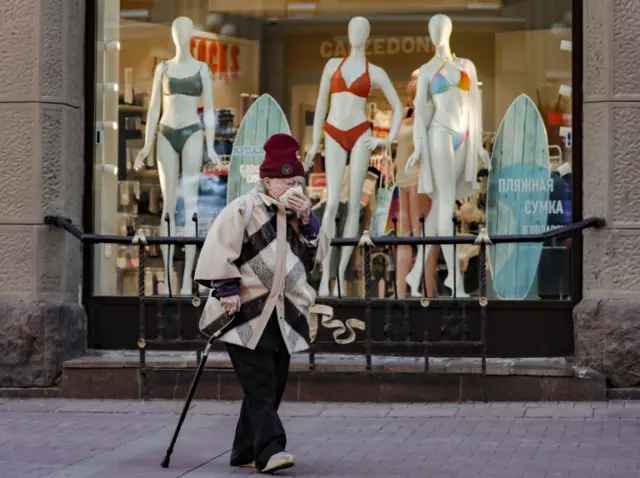 Image source, EPA
Image source, EPARussia has reported a spike in new Covid infections for the eighth day running.
The country's Covid-19 HQ recorded 11,699 new cases on 10 June - the highest such figure since 24 February.
Speaking to state news agency RIA Novosti on 9 June, one of the country's top epidemiologists Alexander Gintsburg suggested the recent rise in new cases was down to socialising in the summer.
"Summer has come, there is far more interaction, people's mobility is increasing compared with the winter period which is why naturally there is an increase in incidence among those who have not been vaccinated," he said.
Gintsburg, whose Gamaleya Research Institute of Epidemiology and Microbiology developed the Sputnik V vaccine - one of Russia's three vaccines against the virus - urged the public to get vaccinated.
President Vladimir Putin and senior officials have made repeated appeals to Russians about receiving a jab, but public enthusiasm has been persistently low.
In February only 30% of Russians said they were willing to receive the Sputnik V jab, according to independent pollster Levada Centre, while a survey in May by the SuperJob website found 42% of those still unvaccinated did not want a jab "under any circumstances".
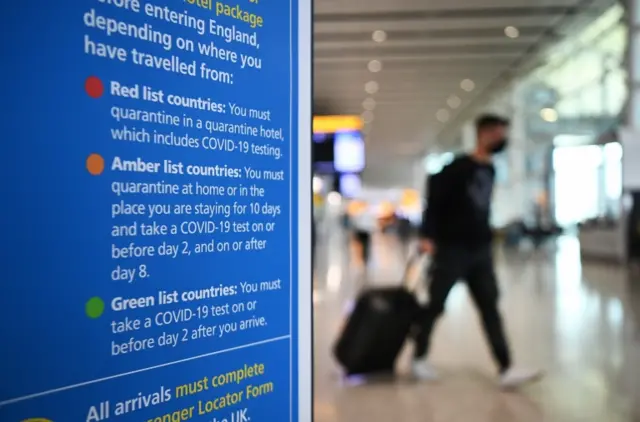 Image source, EPA
Image source, EPAFormer prime minister Theresa May has criticised Boris Johnson's international travel restrictions, saying "global Britain is shut for business".
Speaking in the House of Commons, she says the government had failed to act on its June 2020 promise to get internationally-agreed standard health measures in place.
"One year on, we are no further forward - indeed, what we have is a devastated industry, jobs lost and global Britain shut for business." she says. "More than not being any further forward, we've gone backwards."
May says that last year she went to Switzerland in August and South Korea in September - questioning why travel was possible when there was no vaccine, yet now there is a vaccine it is not.
She also says the traffic light system is "chaotic" and that business travel is "practically impossible".
May says the UK is "falling behind the rest of Europe" when it comes to making decisions on travel, adding of the government: "It needs to decide whether it wants an airline industry and aviation sector in the UK or not, because at the rate it's going it won't have one."
 Harriet Agerholm
Harriet Agerholm
Data journalist
The gap between Covid-19 case rates among the old and young is growing.
In Blackburn with Darwen in Lancashire, where cases are surging and the Delta variant has been found in high concentrations, the most recent average case rate in the under 60s is now about six times that of those aged 60 and over.
During earlier waves of the pandemic, case rates among older people in hotspot areas caught up with those of younger people, but this time it looks different.
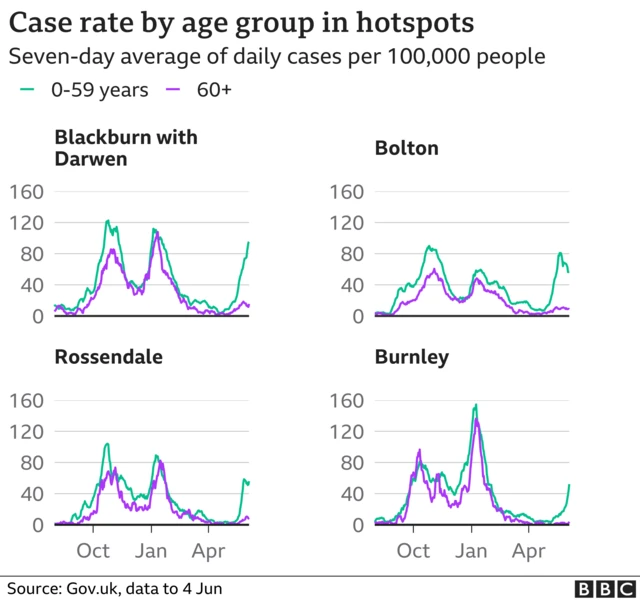
Local leaders have been calling on eligible people to have their second jab, and these high rates of infection among lower priority groups could demonstrate just why having two doses is so important.
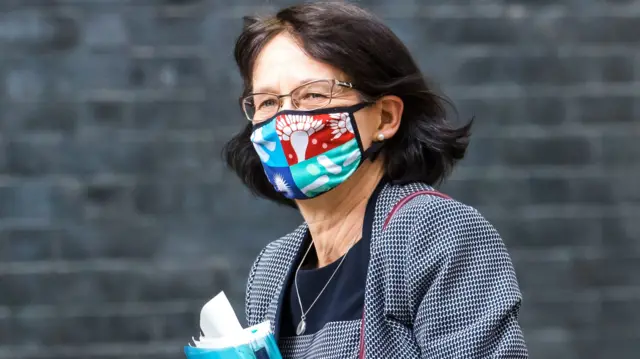 Image source, EPA
Image source, EPACovid cases in the UK are not heading in the right direction and data suggests there will be a further rise soon, says chief executive of the UK Health Security Agency Dr Jenny Harries.
"We are progressing, probably as a country, not quite in the right direction that we would all want to," she told a Royal Society of Medicine webinar.
"Cases are rising, I think that is becoming clearer and modelling does suggest that we would start to see a further rise, not necessarily immediately but in coming weeks."
The latest Public Health England data shows case rates in England have risen in almost every age group, with the highest rise among people in their 20s.
Dr Harries said older people were not getting ill because they have had two jabs, while those in hospital have either only had one dose or are unvaccinated.
She said the virus is "not going to go away", with factors including a possible drop in vaccine effectiveness against new variants and a "large reservoir" of people who can transmit it.
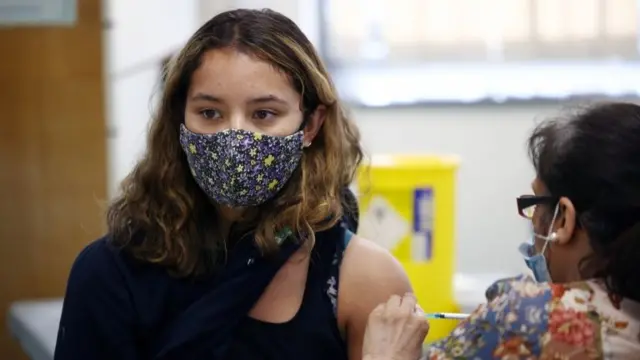 Image source, Reuters
Image source, ReutersAnd more from the UK's daily figures - 176,559 more people had their first dose of a coronavirus vaccine yesterday, with 316,258 having a second dose.
In total, 40,886,878 have now had their first jab and of them, 28,857,102 have had both doses - that's 54.8% of the UK's adult population.
In the last seven days, there have been 44,008 new positive coronavirus tests in the UK. That's a rise of 17,036 - or 63.2% - from the previous week.
And there have been 55 deaths in the past seven days, a rise of one - or 1.9% - from the week before.
There have been 7,393 new daily cases of coronavirus reported in the UK, according to the latest figures., external
That's the second day running cases have topped 7,000 - prior to this that number was last surpassed in late February.
In addition, there have been seven more deaths reported of people who had tested positive within the previous 28 days.
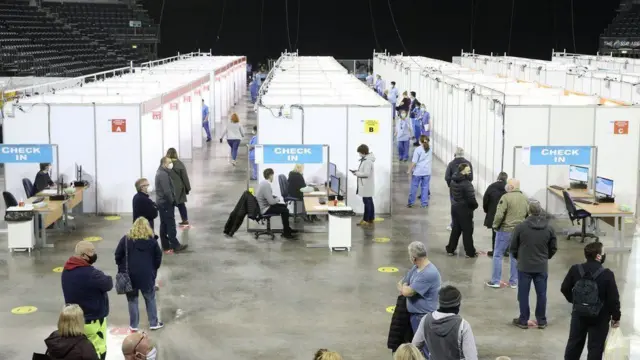 Image source, Pacemaker
Image source, PacemakerThe gap between the first and second doses of the Covid-19 vaccine is to be cut in Northern Ireland. There is currently a gap of 10-12 weeks between the two doses of either the AstraZeneca or Pfizer vaccines.
It is now being reduced to a maximum of eight weeks, the Department of Health has said.
It's intended to offer better protection against the Delta variant, first detected in India, which is more transmissible.
The first dose is thought to be 30% effective against it, while this increases to about 80% following a second dose.
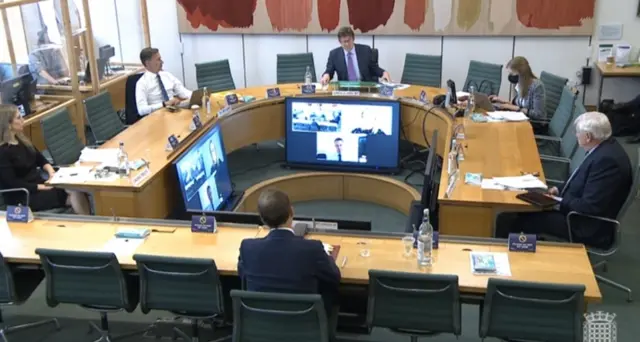 Image source, PA Media
Image source, PA MediaHancock, centre with his back to the camera, giving evidence earlier
Labour's shadow social care minister Liz Kendall says evidence from Matt Hancock at the science and health committees was "at best disingenuous".
She says: "He selectively used briefings, evidence and clinical advice to defend his record instead of admitting his abject failure to protect care homes in the pandemic.
"Even Matt Hancock knows he now categorically failed to put a protective ring around care homes.
"He has now used multiple excuses for failing to test those discharged to care homes, and family members who have lost loved ones will be frustrated and deeply upset that they still do not have the truth from the Secretary of State today."
Hundreds of Welsh fans are expected in Azerbaijan for Wales' opening Euro 2020 match, despite the UK's travel guidance.
Thousands were due to fly to the capital Baku this week for the start of the tournament, which has been delayed by a year because of the pandemic.
Wales play Switzerland in Baku on Saturday, Turkey on Wednesday, and the Italians in Rome the following Sunday.
Azerbaijan and Italy are on the UK and Welsh governments' amber lists, external, meaning you should not travel there.
First Minister Mark Drakeford and the Football Association of Wales have called on fans not to go to the matches.
Before returning to Wales, they will need to take a PCR test, and then quarantine at home for 10 days, external.
Read the full story here.

 Ben Wright
Ben Wright
BBC political correspondent
Regrets? Matt Hancock has a few.
Such as not challenging the assumption within Whitehall early last year that the public wouldn't tolerate a lockdown to contain Covid.
He "bitterly regretted" that he had not overruled scientific advice at the start of the pandemic that assumed coronavirus could not be transmitted asymptomatically.
Mr Hancock said the death rate in care homes "weighed heavily" on him.
But over four and half hours the health secretary defended the government's actions on several fronts - from PPE provision to care homes - making claims that will be scrutinised further.
Dominic Cummings sat in the same chair two weeks ago and heaped scorn on blame on his former colleagues (most venomously on Mr Hancock).
In contrast, the health secretary said ministers and officials largely did their best in unprecedented circumstances.
Mr Hancock strenuously avoided mentioning Mr Cummings by name but swatted away his allegations when they were put to him by MPs.
While assiduously praising those he worked with Matt Hancock also gave the impression that what the crisis really needed was more Matt Hancock.
After having his name trashed by Mr Cummings a fortnight ago this was quite a bounce back.
Matt Hancock ended his evidence saying the government was now better prepared to handle another pandemic.
It had better be because Mr Hancock's testimony added to the picture of a government stunned, sometimes inert and often overwhelmed as the Covid crisis engulfed it at the start of last year.
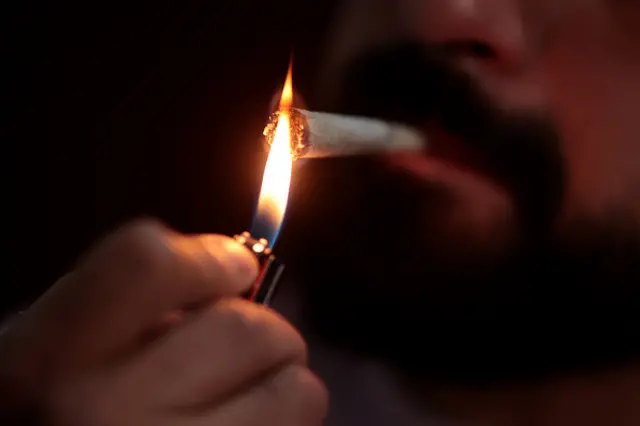 Image source, Getty Images
Image source, Getty ImagesIn a bid to boost vaccination numbers, officials in the US state of Washington are allowing marijuana retailers to host their own vaccine clinics and to offer a single, pre-rolled cannabis cigarette to anyone aged over 21 who gets their jab there.
The scheme, announced on Monday, is the latest of many vaccine incentives being offered in the west coast state, including free pints of beer, sports tickets and prize money.
Back in 2012, Washington and Colorado became the first states to legalise the adult use of cannabis, and regulated sales began two years later. It's been a major source of tax revenue for Washington state, bringing in over $395m (£280m) in 2019.
Unlike purveyors of alcohol, cannabis retailers are being given tax breaks on the joints they give away. But the high-minded scheme is set to expire 12 July – meaning many customers will be unable to return for a second dose.
Many businesses also face legal hurdles since their industry is still illegal at a federal level.
Daniela Bernhard, the co-owner of Uncle Ike’s cannabis store in Seattle, told AP news agency that their efforts to host a vaccine clinic had been rejected by two healthcare providers.
A spokesperson for Spokane Regional Health District, a local public health agency, also told AP that they wouldn't be able to provide marijuana businesses with any vaccines because of concerns that it would jeopardise their own federal funding.
Ms Bernhard said she was “disappointed that our legal and heavily regulated sector continues to be treated differently than our peer sectors”.
“If we are trusting adults driving with their vaccination cards to get a pint of beer and then responsibly get to their next destination, we can also trust that adults will pick up a joint and enjoy it later in a legal setting,” she added.
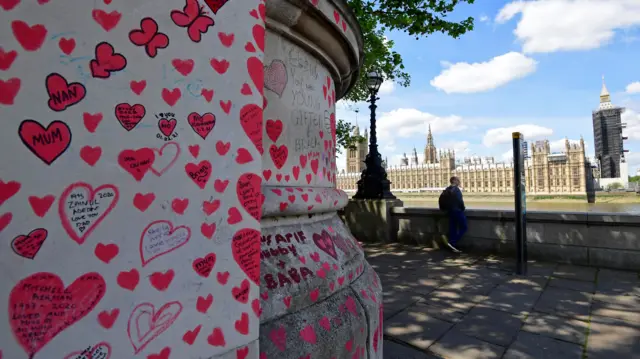 Image source, Reuters
Image source, ReutersThe National Covid Memorial Wall in London
A campaign group for families bereaved by Covid-19 has said Matt Hancock's evidence to MPs shows "he blames everyone but himself and the government for the handling of the pandemic".
In a statement posted to Twitter, Covid-19 Bereaved Families for Justice UK said: "Scientists, the public and advisers are all seemingly at fault according to a minister who suggested he was continually unaware of important details.
"Even when directly challenged to agree that the first lockdown came too late he shirked the opportunity to show humility, instead choosing to speak on something else while not denying what we all know - the late lockdown cost lives.
"Hundreds of thousands of bereaved families will have felt a shudder as Matt Hancock stated 'sometimes you have to put yourself in jeopardy'.
"The truth is it was our loved ones who were placed in jeopardy and they paid for it with their lives."
They urged Hancock to meet with bereaved families so he could be "better informed" of the challenges they have faced.
 Image source, Getty Images
Image source, Getty ImagesMinisters at Stormont have agreed an indicative date of 21 June for live music and theatre to resume across venues in NI.
But this still has to be rubber-stamped by the executive next week, in line with health advice.
Many venues have been closed to audiences since March 2020.
The executive is also understood to have agreed to proposals to raise limits on social contact with others at home from that date.
It would allow 10 people from two households to meet indoors from that date. Currently only six people from two households can meet inside a home.
The number of people allowed to meet outdoors in a private garden could rise to 15 from any number of households on that date.
21 June has also been agreed as an indicative date for lifting the cap of 500 people at outdoor gatherings, instead replacing it with numbers by risk assessment. The changes could mean the return of some larger concerts, sporting events and festivals this summer.
Ahead of the executive meeting, Colin Neill, chief executive of Hospitality Ulster, said he would "encourage the executive to do the right thing" and allow the return of live music.
"Northern Ireland is known for its rich fabric of talented musicians. These musicians, and the venues which host them, feel left behind," he said.